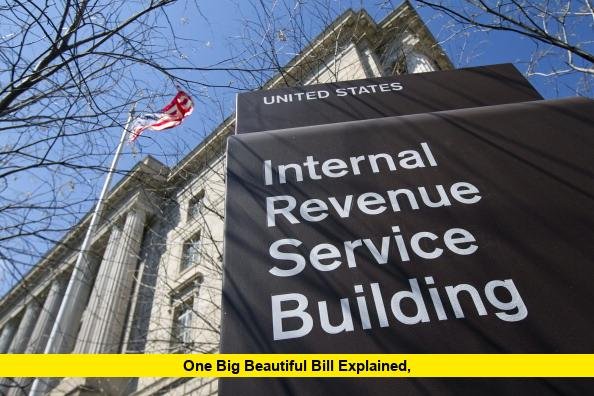One Big Beautiful Bill Explained: As of July 28, 2025, the One Big Beautiful Bill continues to reshape economic and policy frameworks across the United States. Since its signing on July 4, 2025, new clarifications and IRS guidelines have emerged, helping Americans better understand how these sweeping tax and spending changes will affect their finances this year and beyond.
What’s New in the One Big Beautiful Bill?
After the initial rollout, federal agencies and lawmakers have provided further updates on implementation. These refinements highlight how the bill’s provisions will directly impact taxpayers, families, and businesses.
Key Points Summary
- Signed into law July 4, 2025, with effective provisions starting in the 2025 tax year.
- IRS guidelines now clarify eligibility for tax exemptions on tips, overtime, and Social Security income.
- The Child Tax Credit of $2,500 per child remains in effect through 2028.
- Medicaid cuts (~$930 billion over 10 years) proceed, with states adjusting programs accordingly.
- Student loan forgiveness programs remain rescinded; repayment plans tightened.
- Clean energy tax credits now officially phased out as of July 1, 2025.
- Defense and border security budgets continue to expand under the bill’s allocations.
- “Trump Accounts,” tax-exempt savings accounts for newborns, are set for nationwide rollout beginning August 2025.
Read Also-One Big Beautiful Bill Explained: What You Need to Know About Trump’s Latest Legislation
IRS and Treasury Updates: What Taxpayers Should Know
The Internal Revenue Service recently released detailed guidelines explaining how taxpayers should report earnings qualifying for the new tax exemptions:
- Tips and Overtime Reporting: Workers with incomes below $150,000 (single) or $300,000 (joint) must still report tips and overtime but owe no federal income tax on these earnings through 2028.
- Social Security Benefit Taxation: For many retirees, taxing of Social Security benefits is suspended, offering additional relief.
- Form Changes: New tax forms and updated versions of W-2 and 1099 will reflect these changes for the 2025 filing season. Employers must begin adapting payroll systems to comply.
- Limitations and Phase-Outs: Higher-income households will see gradual reductions in some benefits starting 2027.
Spending Changes and Sector Impact
- Medicaid funding reductions require state governments to adjust budgets; some have already announced tightened eligibility rules.
- SNAP work requirements begin implementation in several states as federal oversight increases.
- With clean energy credits phased out by mid-2025, renewable energy developers face financial hurdles; however, the oil and gas sector sees increased federal support.
- Defense spending is on track for a historic peacetime high, with spending contracts accelerating infrastructure and staffing projects.
| Update | Status/Notes | Effective Date |
|---|---|---|
| IRS Guidelines Published | Detailed reporting instructions | July 15, 2025 |
| Clean Energy Credit Phaseout | Credits end for wind, solar, EV | July 1, 2025 |
| Medicaid and SNAP Updates | States adopt new eligibility rules | Ongoing throughout 2025–27 |
| Trump Accounts Rollout | Nationwide initiation | August 2025 |
| Defense & Border Security | Funding disbursed per bill provisions | Immediate and ongoing |
What to Expect Going Forward
The coming months will be critical for Americans adjusting to these changes. Taxpayers should:
- Monitor IRS announcements for filing instructions and potential adjustments.
- Watch their state governments for updates on Medicaid and SNAP eligibility.
- Evaluate personal budgets related to changes in tax liabilities and benefits.
- Stay informed about new financial products like the Trump Accounts aimed at long-term savings.
While supporters emphasize that the bill rewards hard work and encourages savings, critics remain concerned about its social and environmental impacts. The dialogue is ongoing, and government transparency will be key to ensuring Americans understand the trade-offs involved.
Feel free to share how these changes are affecting you or your community in the comments below. Stay tuned for updates as this significant legislation continues to unfold.
